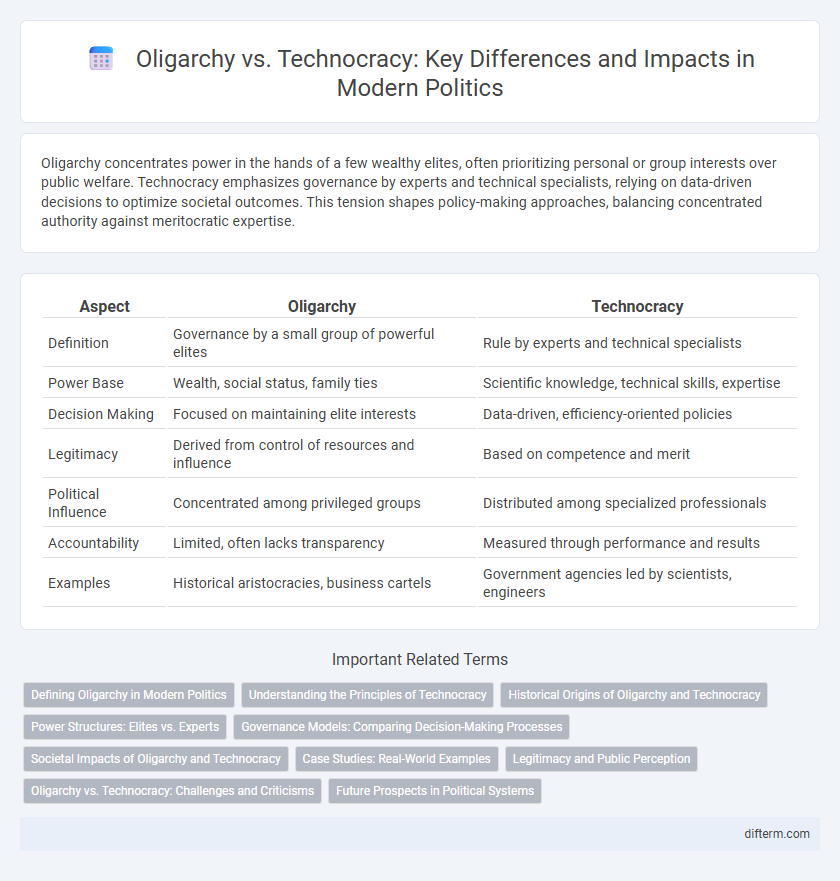Oligarchy concentrates power in the hands of a few wealthy elites, often prioritizing personal or group interests over public welfare. Technocracy emphasizes governance by experts and technical specialists, relying on data-driven decisions to optimize societal outcomes. This tension shapes policy-making approaches, balancing concentrated authority against meritocratic expertise.
Table of Comparison
| Aspect | Oligarchy | Technocracy |
|---|---|---|
| Definition | Governance by a small group of powerful elites | Rule by experts and technical specialists |
| Power Base | Wealth, social status, family ties | Scientific knowledge, technical skills, expertise |
| Decision Making | Focused on maintaining elite interests | Data-driven, efficiency-oriented policies |
| Legitimacy | Derived from control of resources and influence | Based on competence and merit |
| Political Influence | Concentrated among privileged groups | Distributed among specialized professionals |
| Accountability | Limited, often lacks transparency | Measured through performance and results |
| Examples | Historical aristocracies, business cartels | Government agencies led by scientists, engineers |
Defining Oligarchy in Modern Politics
Oligarchy in modern politics refers to a power structure where a small group of individuals or families wield significant control over political decisions, often prioritizing their interests over the broader population. This concentration of authority contrasts with technocracy, which emphasizes decision-making by experts and specialists based on knowledge and merit. In oligarchies, economic influence and elite networks frequently dictate policy outcomes, undermining democratic processes and broader public participation.
Understanding the Principles of Technocracy
Technocracy prioritizes governance by experts and specialists who apply scientific methods and data-driven decisions to policy-making, contrasting with oligarchy where power is concentrated among a small, often hereditary elite prioritizing personal interests. The principles of technocracy emphasize efficiency, rationality, and meritocracy, where leaders are selected based on their expertise in fields such as economics, engineering, and social sciences rather than political influence or wealth. This approach aims to create transparent, evidence-based governance systems that enhance public welfare through informed, objective analysis and long-term planning.
Historical Origins of Oligarchy and Technocracy
Oligarchy, originating from ancient Greece, denotes rule by a small, privileged group often based on wealth or aristocratic lineage, marking its presence in early city-states like Sparta and Corinth. Technocracy emerged during the early 20th century, emphasizing governance by technical experts and scientists, notably gaining traction amid industrialization and crises such as the Great Depression. These distinct origins reflect divergent approaches to authority: oligarchy rooted in hereditary or economic power, and technocracy grounded in specialized knowledge and managerial efficiency.
Power Structures: Elites vs. Experts
Oligarchy centralizes power among a small group of elites who control political and economic resources, often prioritizing their own interests and maintaining influence through networks of loyalty and wealth. Technocracy, in contrast, emphasizes governance by experts possessing specialized knowledge and technical skills, advocating for decision-making based on data, efficiency, and evidence-based policies. The fundamental tension between these power structures lies in the source of authority: inherited or concentrated elite status in oligarchies versus meritocratic expertise in technocracies.
Governance Models: Comparing Decision-Making Processes
Oligarchy centralizes decision-making authority among a small, elite group that often prioritizes personal or class interests, leading to governance driven by power consolidation rather than public welfare. Technocracy delegates authority to experts and specialists, emphasizing evidence-based policies and data-driven decisions to optimize efficiency and societal outcomes. The contrast lies in oligarchic governance relying on hierarchical influence and political maneuvering, whereas technocratic systems focus on technical expertise and rational problem-solving within institutional frameworks.
Societal Impacts of Oligarchy and Technocracy
Oligarchy concentrates power in the hands of a few elite individuals, often leading to social inequality, reduced political participation, and policy decisions that benefit the wealthy at the expense of broader societal welfare. Technocracy emphasizes governance by experts and specialists, promoting evidence-based policies and efficiency, which can enhance public services and innovation but may limit democratic representation and accountability. The societal impact of oligarchy tends to exacerbate social stratification, while technocracy can drive progress yet risk disconnecting governance from the populace's diverse needs.
Case Studies: Real-World Examples
Oligarchy manifests in Russia through concentrated power in the hands of wealthy elites controlling key industries, influencing political decisions without broader public accountability. In contrast, Singapore exemplifies technocracy, where governance is driven by highly skilled experts implementing policies based on data and technical expertise, leading to efficient economic growth and social stability. These case studies highlight how oligarchic control often prioritizes elite interests, while technocratic systems emphasize meritocratic governance and pragmatic solutions.
Legitimacy and Public Perception
Oligarchies often face challenges to legitimacy due to concentrated power among elites, leading to public skepticism and perceptions of inequality. Technocracies tend to gain legitimacy through reliance on expertise and data-driven decision-making, which can foster trust in competence but may risk alienating those who value democratic participation. Public perception of both systems hinges on transparency, accountability, and the extent to which citizens believe their interests are represented.
Oligarchy vs. Technocracy: Challenges and Criticisms
Oligarchy concentrates political power in the hands of a few elites, often leading to unequal influence and limited representation, raising concerns about corruption and resistance to social change. Technocracy emphasizes rule by experts based on specialized knowledge and efficiency but faces criticism for potential elitism and lack of democratic accountability. Both systems struggle with balancing expertise and inclusive governance, posing challenges in legitimacy and responsiveness to public needs.
Future Prospects in Political Systems
Oligarchies concentrate power among a wealthy few, often leading to entrenched inequality and limited social mobility, which could provoke increased political unrest and demands for reform in future governance structures. Technocracies emphasize expertise and data-driven decision-making, offering potential solutions to complex societal challenges such as climate change and technological innovation, but risk alienating the general populace due to perceived elitism. The future political landscape may witness hybrid models that integrate oligarchic influence with technocratic efficiency to balance power consolidation and pragmatic governance.
oligarchy vs technocracy Infographic

 difterm.com
difterm.com